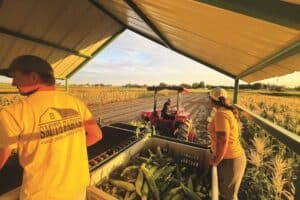Editor’s note: Much has been written about Claremont Ranch and its water issues, so we asked Kathy Hare, president of the Upper Black Squirrel Groundwater Management District and reporter for The New Falcon Herald, to write a commentary on her thoughts and experiences about the ongoing conflict involving water rights. The views are her own, and may not reflect the views of other board members or, of course, the newspaper.I recently took a ride through Claremont Ranch, west of Highway 24 near Constitution Avenue. The area is a sea of rooftops, numerous homes in various stages of construction and new parcels of land being prepared for development. As I watched two women push their children in strollers down the sidewalk, I wondered if they knew the water supply for this development is in serious jeopardy.Claremont Ranch gets their water via the Cherokee Metropolitan District, which pumps it from wells in the Upper Black Squirrel Basin. While the basin is a renewable resource that is replenished by rainfall, well levels in the basin have declined for decades because of over pumping by irrigators and large municipal well owners.To protect the water supply in the basin, a groundwater management district was formed in 1973 -the Upper Black Squirrel Creek Groundwater Management District.As far back as 1985, board members for UBSCGWMD and Cherokee argued over whether Cherokee had the right to take water from certain wells – they called the wells “Cherokee wells 1 through 8” – and use it outside the boundaries of the UBS basin. In water lingo, this is called “exporting.”Water used in homes or on crops within a basin returns to the soil and eventually goes back into the water supply. But once water is exported from a basin, it is gone forever.In 1999, UBSCGWMD and Cherokee made an agreement that Cherokee would only export water from wells 1 through 8 in case of an emergency. Dean Goss, who was the president of UBS board in 1999, said it seemed like a clear-cut agreement at the time. But over the years, Cherokee continued to export water from these wells. Peter Susemihl, attorney for Cherokee, claimed they had the right to do so because they couldn’t get enough water from other wells they owned in the Upper Black Squirrel and that constituted an “emergency.” And when the population expanded east of Colorado Springs, Cherokee continued to make more water commitments, especially in the Claremont Ranch area.Fast-forwarding to 2005, the Colorado State Engineers Office declared that “Cherokee had no right to use wells 1 through 8 to export water.” A lawsuit ensued. Andy Jones, attorney for the UBSCGWMD, and the state engineers office asked the El Paso County Board of County Commissioners not to approve any more subdivisions using water exported by Cherokee until the lawsuit was resolved.But representatives from Cherokee convinced the BOCC they had enough water rights to cover their commitments. And a spokeswoman for a bond company told the commissioners that $24 million of bond money for a bridge on Marksheffel Road and other development was on the line. If the board didn’t approve the latest Claremont Ranch filing, those bond funds would go away, at least for now.In a 4-1 vote, with Commissioner Douglas Bruce dissenting, the BOCC decided to go against a long-standing county tradition and approved parts of the Claremont Ranch subdivision over the objections of the state engineers’ office. Cherokee’s water commitments now reached 4,944 acre feet of water annually. The source for all that water was the UBS Basin.On March 17, 2006, District Water Court Judge Maes ruled in favor of the UBSCGWMD. Maes wrote, an emergency “does not include massive development outside the basin,” and he limited Cherokee’s export rights to 2,683 acre feet per year. And his ruling means that Cherokee must get 2,261 acre feet of water annually from some source other than wells 1 through 8.The ruling will not affect homes in Falcon, Peyton or Ellicott that are within the UBS Basin, but homes in Claremont Ranch may find their taps running dry, unless another water supply can quickly be found.Kip Petersen, who recently became the manager of the Cherokee Metro District, said it’s his job to find that water supply. He said he’s working diligently to do so. I sincerely wish him the best.Presently, county officials want Cherokee and UBS board members to sit down and work out a compromise. But a court ruling has been handed down, and it is currently being appealed to the Colorado Supreme Court.The UBSCGWMD Board has an obligation to protect the water within the basin. They have issued a Cease and Desist order to make sure Cherokee stops exporting more than the amount of water decreed by Judge Maes. In my estimation, UBSCGWMD has done its job; now it’s time for the BOCC and Cherokee to do theirs.Water must be found for Claremont Ranch before the women pushing those baby strollers turn on the faucet, only to discover there is no water. Development must be stopped in that area until there is a water supply, or those bonds will go belly up like a fish in an empty pond. Furthermore, water must be found outside of the Upper Black Squirrel Basin, because Cherokee has already taken enough of our water.






